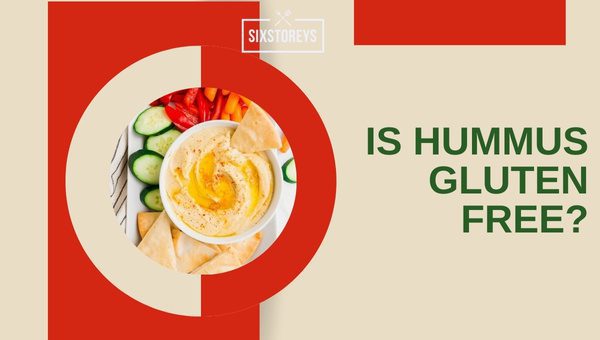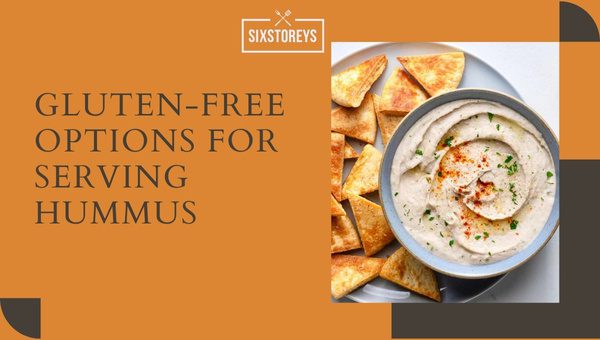Is Hummus Gluten Free? Your Diet Needs This Info
Navigating the world of gluten-free eating can often feel like an adventure map where you're constantly discovering which foods are your friends and which are foes. So naturally, every so often you may ponder over the gluten content of your favorite dishes, like the increasingly popular hummus. "Is hummus gluten free?" you may wonder. Cozy and savory, hummus is enjoyed across the globe as a tasty dip or spread. Made from chickpeas, tahini, garlic, lemon, and olive oil, it appears to be safe for those with gluten intolerances. But do all these wholesome ingredients add up to a gluten-free dip? Well, let's dive in and see what's what.
Also Read: Best Gluten-Free Crackers
Article Includes
Is Hummus Gluten Free?

Yes, traditional hummus is gluten free. The primary ingredients of hummus are chickpeas, tahini (a paste made from sesame seeds), lemon juice, garlic, and olive oil. None of these ingredients naturally contain gluten, making hummus a safe and delicious option for those who adhere to a gluten free diet.
Understanding Gluten and Hummus
Gluten is a type of protein found in grains such as wheat, barley, and rye. It's what gives bread and other baked goods their stretchy, chewy texture. However, for people with celiac disease or gluten sensitivity, consuming gluten can cause a variety of health issues.
Hummus, on the other hand, hails from the Middle East and its basic recipe doesn't include any grains, let alone those with gluten. The star ingredient, chickpeas, is a type of legume. Tahini is ground sesame seeds, and the rest of the ingredients - garlic, lemon, and olive oil - are all naturally free from gluten.
Variations of Hummus
While the traditional hummus recipe is gluten-free, many variations have popped up globally. Some innovative recipes might add ingredients like roasted red pepper, beetroot, or avocado. These are all exciting and gluten-free additions.
However, be aware of versions that incorporate soy sauce (which commonly contains wheat), or other gluten-containing additives. Always make sure to check the list of ingredients if you find exotic variations, as they may not always be gluten free.
In short, basic hummus is gluten free. However, it's always crucial to check the ingredients, especially when opting for store-bought hummus or variations of the basic recipe. Soon enough, you'll discover that hummus can be safely enjoyed in your gluten-free lifestyle.
The Surprising Gluten-Free Nature of Hummus

Lo and behold, your favorite creamy dip – hummus, is naturally gluten-free. Yes! You heard it right. The smooth, nutty blend of chickpeas, tahini (sesame seed paste), lemon juice, garlic, and a touch of olive oil has no trace of wheat, barley, or rye - the common sources of gluten. It's a delightful revelation, especially for those with gluten sensitivities. The main hero of hummus, chickpeas, are not just gluten-free but also a great source of protein, making hummus a healthier choice for dietary plans.
However, while the traditional homemade hummus recipe is gluten-free, store-bought hummus may occasionally contain gluten. Sometimes, gluten-containing ingredients are added for flavor or thickening. This brings us to the subject of identifying gluten in prepared hummus.
How to Identify Gluten in Prepared Hummus?
When it comes to evaluating store-bought hummus for gluten, a few tips can come in handy. Firstly, always remember to check the label. You should be looking for labels that specifically say "Gluten-Free" as this indicates the product meets the FDA guidelines for being gluten-free - less than 20 parts per million (ppm) of gluten. In this day and age, you'll find a considerable number of hummus brands proudly sporting this information on their labels.
Watch out for words like "wheat," "rye," "barley," "malt," and "brewer’s yeast" in the ingredient list. While these are not typically present in hummus, manufacturers may use them for flavor or texture enhancements. Reading the label can save you from potential trouble.
Here's another crucial point – beware of cross-contamination. Even if hummus ingredients don't naturally have gluten, it can get contaminated with gluten during the manufacturing process, especially if it's being produced in a facility that also handles gluten-containing foods. Look for a statement about manufacturing processes on the packaging to avoid cross-contamination risk.
With these guidelines, you can navigate through store aisles armed with information to make the right choice for you. After all, not only is hummus delicious, robust in flavor and creamy in texture, it can enable a world of dishes on a gluten-free journey.
Gluten-Free Options for Serving Hummus

When living a gluten-free lifestyle, you don't have to quit enjoying the simple pleasures of life, and that includes sinking a delicious dipper into a bowl of velvety hummus. Traditionally, hummus is served with pita bread, which is chock-full of gluten. But who said traditions can't be tweaked?
Here, we have an array of gluten-free options for serving:
- Veggie Sticks: Fresh veggies like carrots, cucumbers, and bell peppers are full of crunch and flavor. They make an excellent gluten-free partner for your hummus.
- Rice Crackers: These are easily available and come in a variety of flavors, providing a gluten-free crunch for your hummus.
- Gluten-Free Bread or Crackers: If bread is your preferred medium, there are gluten-free options readily available in the marketplace.
- Corn Chips: Opt for a corn-based alternative such as tortilla chips. Just be sure to check the label for any possible gluten contamination.
Choosing Gluten-Free Hummus Brands
Yeah, it’s fun to make your own hummus at home, but we get it—sometimes you just need the convenience of a pre-packed tub. When you're out shopping, and you ask yourself, "Is hummus gluten free?" - the answer gets trickier. While the basic hummus ingredients are gluten-free, many store-bought brands can sometimes include additives, preservatives, and flavorings that contain gluten. Plus, there's the risk of gluten cross-contamination during manufacturing.
Nevertheless, there are a few brands known for their gluten-free hummus options:
- Sabra: The brand's classic hummus is gluten-free and deliciously creamy.
- Tribe: They have a wide variety of flavor options, all gluten-free.
- Cava: Known for their fresh ingredients, Cava hummus is a tasty, gluten-free choice.
No matter the brand you choose, it's always important to meticulously read labels when buying. Look out for gluten-free certification and cross-contamination warnings. You can also visit the brand’s website for more detailed ingredient and allergen information. A little bit of care can make sure your favorite dip remains a joy, and not a gluten-filled worry.
Always remember, living gluten-free doesn't mean you have to give up on your beloved hummus. You just need to be a little more cautious and creative in how you dip and shop.
Making Homemade Gluten-Free Hummus

If you want to ensure your hummus is absolutely gluten-free and suits your taste perfectly, making it at home can be an excellent choice. Not to mention, it's simple to make and requires just a few ingredients—many of which you may already have in your pantry.
Ingredients for Homemade Gluten-Free Hummus:
- 1 can of chickpeas, drained and rinsed
- 1/4 cup of fresh lemon juice (about 1 large lemon)
- 1/4 cup of well-stirred tahini
- 1 small garlic clove, minced
- 2 tablespoons of extra virgin olive oil, plus more for serving
- 1/2 teaspoon of ground cumin
- Salt to taste
- 2-3 tablespoons of water
- Dash of ground paprika, for serving
Step-By-Step Guide to Making Your Hummus
Step 1: Into a Food Processor
First, add your key hummus ingredients into a food processor—chickpeas, freshly squeezed lemon juice, tahini, minced garlic, olive oil, ground cumin, and a sprinkle of salt.
Step 2: Process Until Smooth
Secure the lid and process until everything is well mixed and you've reached a smooth texture.
Step 3: Adjust Thickness with Water
If your mixture appears too thick, gradually add water, a tablespoon at a time, until the desired consistency is achieved.
Step 4: Taste and Adjust
Give your hummus a taste, adjusting the salt, garlic, or lemon as needed. You might find you prefer yours a bit more zingy or savory –- it’s all about your taste preference.
Step 5: Serve and Enjoy
When you're happy with the taste and texture, scoop your hummus into a bowl, drizzle with some extra virgin olive oil, and sprinkle with some ground paprika.
Voila! You’ve just created your homemade gluten-free hummus. Serve with your choice of gluten-free bread, crackers, or vegetables. The ability to whip up your own delicious hummus not only certifies its gluten-free status but also makes for a fun and satisfying kitchen project.
Also Read: Is Velveeta Gluten & Dairy Free?
Frequently Asked Questions
What is hummus typically made of?
Hummus is a Middle Eastern dip or spread that is typically made from cooked, mashed chickpeas blended with tahini (sesame seed paste), olive oil, lemon juice, and garlic.
What does gluten-free mean?
Gluten-free means food does not contain the protein gluten, found in grains such as wheat, barley, and rye. Some individuals have celiac disease or gluten intolerance, which causes their bodies to react adversely when they consume gluten.
Can hummus be cross-contaminated with gluten?
Yes, while traditional hummus is gluten-free, there is always a risk of cross-contamination if it’s made or served in a facility or at a restaurant where other gluten-containing foods are present, or if it includes additional ingredients that contain gluten.
Are all brands of hummus gluten-free?
Not necessarily. While traditional hummus itself is gluten-free, manufactured or store-bought hummus may contain added ingredients or be subject to cross-contamination. Always check product labels to make sure it is labeled gluten-free.
Conclusion
The gluten-free journey can be fraught with uncertainty with seemingly innocuous foods throwing you off course. But hummus needn't be one of them. While some store-bought options may pose a risk due to cross-contamination, for the most part, you are free to enjoy this nourishing delicacy without worry. And, if you've got the time, you can even whip up your own version at home, with the added peace of mind, knowing just what's gone into your meal.
So, the next time you see that tub of hummus at the grocery store, remember, it's not necessarily off-limits for those living gluten-free. Just read those labels carefully or better yet, get your apron on and prepare a batch in the comfort of your kitchen. Enjoy this chickpea delight without the looming gluten threat and let the good times roll, or shall I say, dip!
